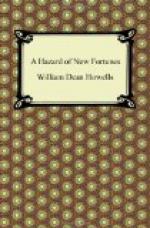“Well,” said the policeman, impartially, as a man might whom the companies allowed to ride free, but who had made friends with a good many drivers and conductors in the course of his free riding, “I guess that’s what the roads would like to do if they could; but the men are too many for them, and there ain’t enough other men to take their places.”
“No matter,” said Beaton, severely. “They can bring in men from other places.”
“Oh, they’ll do that fast enough,” said the policeman.
A man came out of the saloon on the corner where the strikers were standing, noisy drunk, and they began, as they would have said, to have some fun with him. The policeman left Beaton, and sauntered slowly down toward the group as if in the natural course of an afternoon ramble. On the other side of the street Beaton could see another officer sauntering up from the block below. Looking up and down the avenue, so silent of its horse-car bells, he saw a policeman at every corner. It was rather impressive.
III.
The strike made a good deal of talk in it he office of ‘Every Other Week’ that is, it made Fulkerson talk a good deal. He congratulated himself that he was not personally incommoded by it, like some of the fellows who lived uptown, and had not everything under one roof, as it were. He enjoyed the excitement of it, and he kept the office boy running out to buy the extras which the newsmen came crying through the street almost every hour with a lamentable, unintelligible noise. He read not only the latest intelligence of the strike, but the editorial comments on it, which praised the firm attitude of both parties, and the admirable measures taken by the police to preserve order. Fulkerson enjoyed the interviews with the police captains and the leaders of the strike; he equally enjoyed the attempts of the reporters to interview the road managers, which were so graphically detailed, and with such a fine feeling for the right use of scare-heads as to have almost the value of direct expression from them, though it seemed that they had resolutely refused to speak. He said, at second-hand from the papers, that if the men behaved themselves and respected the rights of property, they would have public sympathy with them every time; but just as soon as they began to interfere with the roads’ right to manage their own affairs in their own way, they must be put down with an iron hand; the phrase “iron hand” did Fulkerson almost as much good as if it had never been used before. News began to come of fighting between the police and the strikers when the roads tried to move their cars with men imported from Philadelphia, and then Fulkerson rejoiced at the splendid courage of the police. At the same time, he believed what the strikers said, and that the trouble was not made by them, but by gangs of roughs acting without their approval. In this juncture he was relieved by the arrival of




